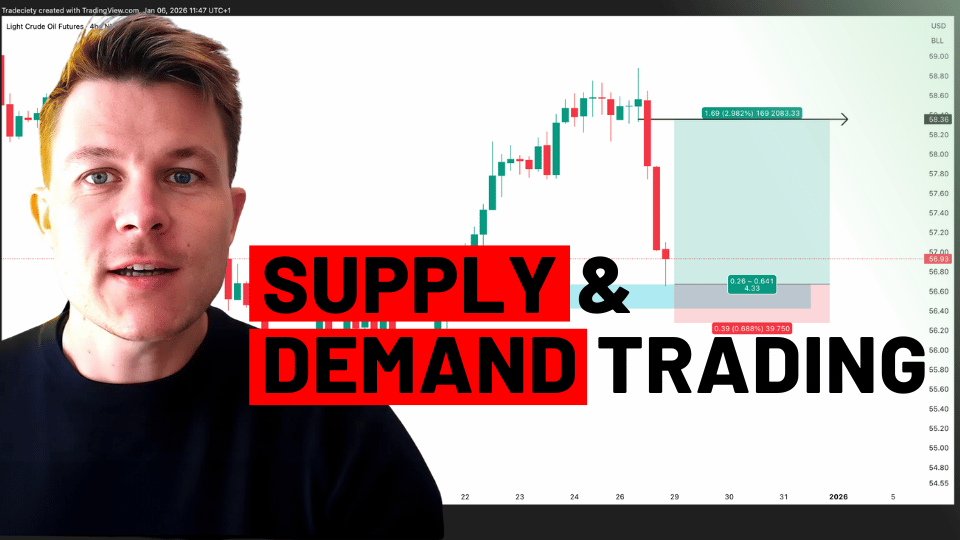Supply and Demand Trading in 2026
We have been trading supply and demand strategies for over ten years, and they have stood the test of time remarkably well. Supply and demand is...

“Markets are never wrong — opinions are.”
Jesse Livermore
In 1929, Jesse Livermore was known as the greatest trader in the world. After years of financial successes, Livermore made $100 million dollars in the stock market crash that led to the Great Depression.
Unfortunately, Livermore struggled with the same problem that many traders face today: his early wins were often followed by cataclysmic losses.
The most challenging aspect of building a successful career as a trader is not a lack of information about the market itself, but too many opinions about how you should put that information into practice. Some of those opinions are grounded in reliable trading principles, but as Livermore discovered over the course of his career, many of them are not.
If you are ready to take your career to the next level, you need a proven trading strategy that will guide your decisions as you navigate the stock market — a strategy that is based on the principles that have led the world’s top traders to long-term financial success. As Livermore famously said, “Whatever happens in the stock market today has happened before and will happen again.” The practices that have led to spectacular trades in the past can help you make millions of dollars in the future.
Here are three leadership tips from the world’s most successful traders, tips that we wholeheartedly endorse:
Integrity, Talent, & Hard Work Are The Foundation Of A Successful Trading Career
“In life, do what’s right. Really. Do what’s right. It won’t hurt you, just keep your priorities straight.”
As the founder and president of Appaloosa Management, David Tepper has been named one of ‘The Highest-Earning Hedge Fund Managers’ in the world by Forbes Magazine. But at one point in his career, Tepper wasn’t sure if he would ever have the opportunity to lead a global hedge fund.
In the 1980s, Tepper worked for Goldman Sachs as the organization’s head trader. When a powerful partner asked him to make a series of unethical and potentially illegal trades, Tepper refused — and almost lost his job.
When Tepper was asked about the experience, he said, “I just didn’t give a sh*t. What was I going to do? Trade for them when I think they’re doing something that’s wrong? And then not see my kids again because I’ll get blamed for the trades?”
Tepper was able to retain his position at Goldman Sachs as he brought in millions of dollars to the company, but his career never recovered. When it was time for Tepper to be considered as a potential partner, he was shot down.
Instead of staying in an organization that would no longer serve his best interests, he started Appaloosa Management in 1993. By utilizing the same practices that had led to his financial success at Goldman Sachs — and his unwillingness to compromise his personal integrity — Tepper built a multi-billion dollar hedge fund and was able to dictate the terms of his business dealings from that point forward.
“The main thing that makes Appaloosa stand apart from the pack is the depth of our analysis and the fact that we’re not afraid to be the first one to act on our convictions,” Tepper said. “If you look at our history over the years, we are usually the first mover in a country or situation, time and time again.”
Turn Your Failures Into Rocket Fuel
“If you’re not failing, you’re not pushing your limits, and if you’re not pushing your limits, you’re not maximizing your potential.”
Today, Ray Dalio is known as a billionaire investor and one of the world’s wealthiest people. As the founder of Bridgewater Associates, a hedge fund with $124.7 billion assets under management, Dalio rose to prominence in the 1970s as an adept trader and consultant.
But all of that changed in 1982, when Dalio predicted that an economic depression was imminent. He traded accordingly and lost everything when the country experienced an economic boom.
Dalio described the experience in his book, Principles: Life and Work: “There I was after eight years in business, with nothing to show for it. Though I’d been right much more than I’d been wrong, I was all the way back to square one. At one point, I’d lost so much money I couldn’t afford to pay the people who worked with me. One by one I had to let them go….Bridgewater was now down to just one employee: me. Losing people I cared so much about and very nearly losing my dream of working for myself was devastating.”
Despite the failure, Dalio held onto his dream of building a global hedge fund. Instead of focusing on the scale of his losses, he took another look at the processes that had led to his financial ruin and fixed them. By the end of 1983, Bridgewater had regained six employees; in 1995, the company employed forty-two people and managed $4.1 billion in client assets. A decade later, it was the largest hedge fund in the world.
Trust The Numbers, Not Your Intuition
“The secret to being successful from a trading perspective is to have an indefatigable and an undying and unquenchable thirst for information and knowledge.”
On Monday, October 19, 1987, Paul Tudor Jones made history by predicting the stock market crash that would cripple the global economy for years to come. By shorting stock index futures in the months before Black Monday, Jones made $100 million in less than 24 hours.
To Jones, the key to this series of successful trades — and the billions of dollars that he has earned as the founder of Tudor Investment Corporation — was his decision to rely on the data that indicated what the current and projected state of the market would be, and not the opinions of so-called experts. “It is not that we had any unfair knowledge that other people didn’t have,” Jones said, “It is just that we did our homework.”

We have been trading supply and demand strategies for over ten years, and they have stood the test of time remarkably well. Supply and demand is...

3 min read
Choosing the right trading journal is essential for traders wanting to analyze performance, refine strategies, and improve consistency. In this...

3 min read
“95% of all traders fail” is the most commonly used trading related statistic around the internet. But no research paper exists that proves this...